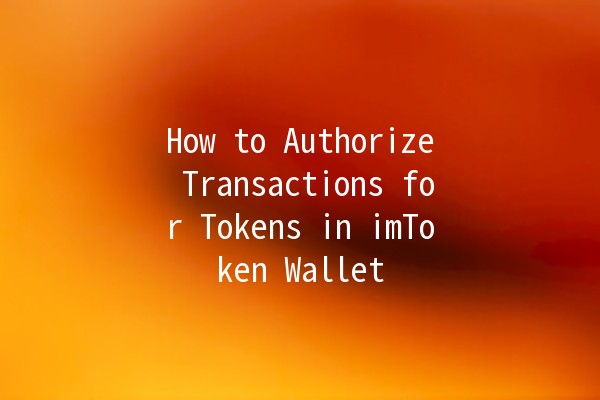As the cryptocurrency ecosystem continues to evolve, understanding wallet functionalities becomes increasingly vital for users. One of the critical features of cryptocurrency wallets, such as imToken, is the ability to authorize transactions for different tokens. This article will delve into how users can efficiently authorize transactions within the imToken wallet, while also providing practical productivity tips to streamline your experience.

imToken is a widely used cryptocurrency wallet that allows users to manage multiple digital assets securely. Among its many features, one stands out: token authorization. This process is essential as it ensures that users can safely interact with different decentralized applications (dApps) and execute transactions with their tokens.
Token authorization acts as a permission system that allows a wallet to access a specified amount of a user's token for transactions. Essentially, it gives dApps the permission to use a portion of a user's assets to facilitate trades, swaps, or other operations. This compels users to understand the authorization process to ensure their assets are secure and used correctly.
The imToken wallet interface is userfriendly and intuitive. Familiarizing yourself with the different sections, such as 'Assets,' 'DApp Browser,' and 'Settings,' can save you significant time when authorizing transactions.
For instance, once you access your wallet, navigate quickly to the 'Assets' tab to review your token balances and select the appropriate token for authorization. This practice enhances efficiency as it allows you to act swiftly without fumbling through menus.
imToken provides users with a transaction history feature. Regularly tracking your authorization history can enhance security and help you manage your authorizations effectively. By checking which dApps have access to your tokens, you can revoke permissions for any application you no longer use, thereby protecting your assets.
Even with the best practices, users may encounter issues while authorizing transactions. Here are common scenarios and their solutions:
Managing your tokens involves more than just authorization; it includes monitoring them. Setting up alerts for significant movements and price changes for your tokens can help you react promptly to market changes.
Many wallets and cryptocurrency tracking apps allow you to customize notifications. For example, users can set alerts for price drops or significant volume changes, thus positioning themselves better regarding their token management.
Several decentralized applications require token authorization. Here are a few examples where token authorization plays a pivotal role:
Decentralized Exchanges (DEXs): Platforms like Uniswap or SushiSwap require token permissions to swap or provide liquidity.
Yield Farming: Many yield farming protocols require token authorization to stake tokens and earn rewards over time.
NFT Marketplaces: For those dealing with NFTs, some marketplaces, like OpenSea, need authorization to transfer tokens for trades.
Managing multiple tokens can become cumbersome. To maximize productivity, consider categorizing your tokens based on your investment strategy (e.g., longterm holds, shortterm trades, etc.).
This categorization simplifies the authorization process when interacting with dApps. For instance, if you plan to utilize a specific dApp frequently, prioritize the tokens associated with that application by authorizing them in bulk.
The authorization process may differ based on the token standard being used, primarily ERC20 or ERC721:
ERC20 Tokens: This is the most common token standard, particularly for fungible tokens. Authorization for ERC20 transactions generally involves a standard contract approval process.
ERC721 Tokens: Nonfungible tokens (NFTs) under this standard may require different approval steps, especially concerning ownership verification.
Being aware of these differences can help you navigate authorizations more effectively, particularly in diverse ecosystems involving both fungible and nonfungible tokens.
Staying active within the imToken community can provide valuable insights into best practices for token authorization and usage. Joining forums, Telegram groups, or social media channels allows you to share experiences and learn from others. Engaging with the community can lead to discovering new dApps and tools that improve your transaction authorization efficiency.
The cryptocurrency space is everevolving, and staying informed is key to safeguarding your assets. Follow reputable news sources and imToken’s official channels for updates on security practices, new features, and changes in token standards.
Regularly updating your knowledge helps you stay one step ahead, reducing the chances of falling prey to phishing attacks or scams when authorizing transactions.
If you authorize more tokens than intended, there is a risk of your tokens being used without your consent. It’s critical to review the authorization amount carefully before confirming any transaction. If you discover an error, you can revoke the authorization through the imToken interface.
Yes, you can revoke token authorization at any time. Navigate to the 'Assets' section and select 'Manage Token Permissions' to review and revoke access to any dApp.
Research is crucial. Check community feedback, reputable reviews, and their standing within the cryptocurrency community to ascertain if a dApp is trustworthy before granting permission.
Not at all. Authorizing tokens grants a dApp permission to access a specified amount of your tokens, while sending tokens involves transferring them to another wallet or address. Always ensure you're clear on the difference before executing any transaction.
Token authorizations do not have a fixed duration. They remain active until you decide to revoke them. Regularly check your authorizations to ensure that you maintain control over your tokens.
If your authorization transaction is stuck, check the network status and ensure you have enough gas fees. If necessary, try canceling the transaction through your wallet interface or use tools that allow you to view pending transactions.
By mastering the authorization process and implementing these productivity tips, you can ensure a smoother experience using imToken, allowing you to focus on growing your digital asset portfolio successfully. Embrace the decentralized future of finance with confidence!